Jupyterjones - Productivity Please !!!

More Posts from Jupyterjones and Others
Calculating the surface area of a sphere. Found on Imgur.
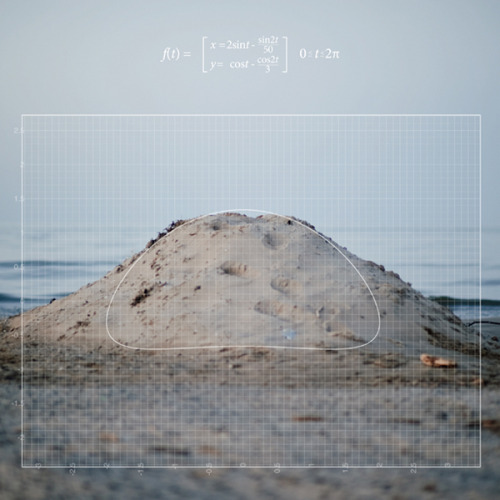
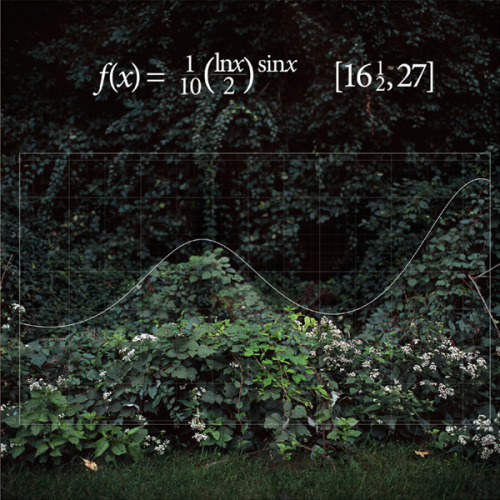
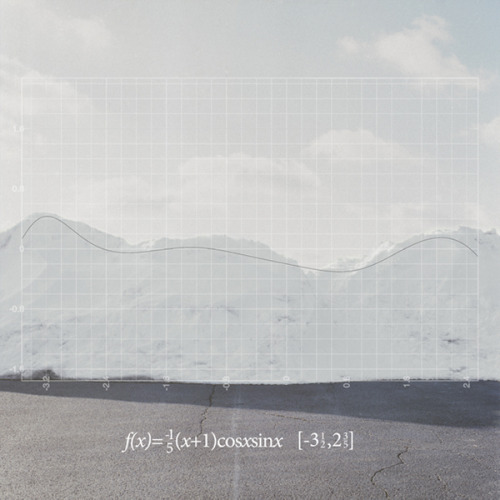

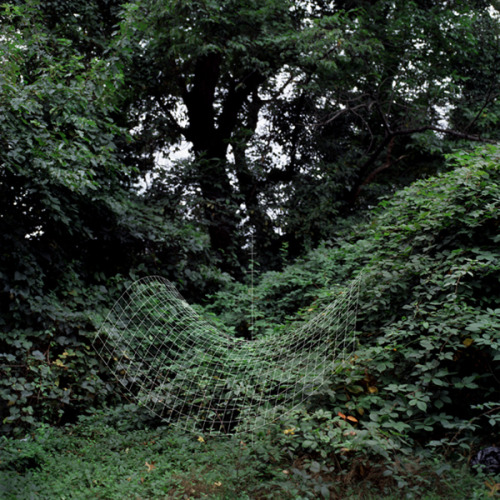



Geometry at work: Maxwell, Escher and Einstein
Maxwell’s diagram
from the 1821 “A Philosophical Magazine”, showing the rotative vortexes of electromagnetic forces, represented by hexagons and the inactive spaces between them
The impossible cube
invented in 1958, as an inspiration for his Belvedere litography.
Geometry of space-time
The three dimensions of space and the dimension of time give shape to the fourth, that of space-time.
Everyone who reblogs this will get a pick-me-up in their ask box.
Every. Single. One. Of. You.
Depixellation? Or hallucination?
There’s an application for neural nets called “photo upsampling” which is designed to turn a very low-resolution photo into a higher-res one.
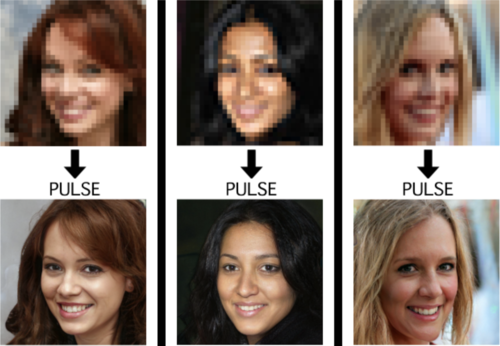
This is an image from a recent paper demonstrating one of these algorithms, called “PULSE: Self-Supervised Photo Upsampling via Latent Space Exploration of Generative Models”
It’s the neural net equivalent of shouting “enhance!” at a computer in a movie - the resulting photo is MUCH higher resolution than the original.
Could this be a privacy concern? Could someone use an algorithm like this to identify someone who’s been blurred out? Fortunately, no. The neural net can’t recover detail that doesn’t exist - all it can do is invent detail.
This becomes more obvious when you downscale a photo, give it to the neural net, and compare its upscaled version to the original.

As it turns out, there are lots of different faces that can be downscaled into that single low-res image, and the neural net’s goal is just to find one of them. Here it has found a match - why are you not satisfied?
And it’s very sensitive to the exact position of the face, as I found out in this horrifying moment below. I verified that yes, if you downscale the upscaled image on the right, you’ll get something that looks very much like the picture in the center. Stand way back from the screen and blur your eyes (basically, make your own eyes produce a lower-resolution image) and the three images below will look more and more alike. So technically the neural net did an accurate job at its task.
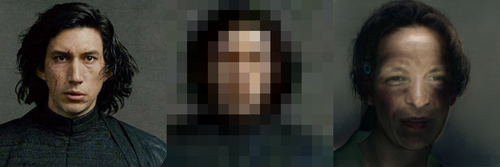
A tighter crop improves the image somewhat. Somewhat.
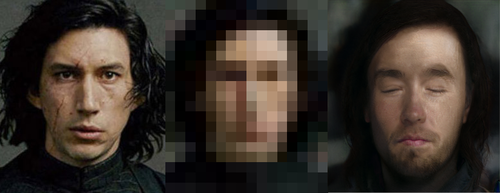
The neural net reconstructs what it’s been rewarded to see, and since it’s been trained to produce human faces, that’s what it will reconstruct. So if I were to feed it an image of a plush giraffe, for example…

Given a pixellated image of anything, it’ll invent a human face to go with it, like some kind of dystopian computer system that sees a suspect’s image everywhere. (Building an algorithm that upscales low-res images to match faces in a police database would be both a horrifying misuse of this technology and not out of character with how law enforcement currently manipulates photos to generate matches.)
However, speaking of what the neural net’s been rewarded to see - shortly after this particular neural net was released, twitter user chicken3gg posted this reconstruction:
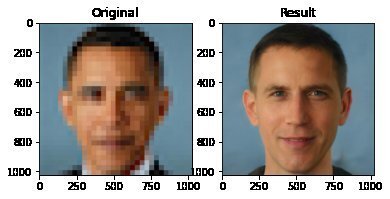
Others then did experiments of their own, and many of them, including the authors of the original paper on the algorithm, found that the PULSE algorithm had a noticeable tendency to produce white faces, even if the input image hadn’t been of a white person. As James Vincent wrote in The Verge, “It’s a startling image that illustrates the deep-rooted biases of AI research.”
Biased AIs are a well-documented phenomenon. When its task is to copy human behavior, AI will copy everything it sees, not knowing what parts it would be better not to copy. Or it can learn a skewed version of reality from its training data. Or its task might be set up in a way that rewards - or at the least doesn’t penalize - a biased outcome. Or the very existence of the task itself (like predicting “criminality”) might be the product of bias.
In this case, the AI might have been inadvertently rewarded for reconstructing white faces if its training data (Flickr-Faces-HQ) had a large enough skew toward white faces. Or, as the authors of the PULSE paper pointed out (in response to the conversation around bias), the standard benchmark that AI researchers use for comparing their accuracy at upscaling faces is based on the CelebA HQ dataset, which is 90% white. So even if an AI did a terrible job at upscaling other faces, but an excellent job at upscaling white faces, it could still technically qualify as state-of-the-art. This is definitely a problem.
A related problem is the huge lack of diversity in the field of artificial intelligence. Even an academic project with art as its main application should not have gone all the way to publication before someone noticed that it was hugely biased. Several factors are contributing to the lack of diversity in AI, including anti-Black bias. The repercussions of this striking example of bias, and of the conversations it has sparked, are still being strongly felt in a field that’s long overdue for a reckoning.
Bonus material this week: an ongoing experiment that’s making me question not only what madlibs are, but what even are sentences. Enter your email here for a preview.
My book on AI is out, and, you can now get it any of these several ways! Amazon - Barnes & Noble - Indiebound - Tattered Cover - Powell’s - Boulder Bookstore

Interesting submission rk1232! Thanks for the heads up! :D :D

Hey guys, I’m observing a high school class and was looking at a textbook, and learned that irrationals are closed under addition! Super cool, who knew!

The simple harmonic oscillator
Anonymous asked: Please explain the intuition of solving the SHM equation.
Okay Anon! Here you go, this is my rendition.
The problem
You have a mass suspended on a spring. We want to know where the mass will be at any instant of time.
Describe the motion of the mass

The physical solution
Now before we get on to the math, let us first visualize the motion by attaching a spray paint bottle as the mass.

Oh, wait that seems like a function that we are familiar with - The sinusoid.

Without even having to write down a single equation, we have found out the solution to our problem. The motion that is traced by the mass is a sinusoid.
But what do I mean by a sinusoid ?
If you took the plotted paper and tried to create that function with the help of sum of polynomials i.e x, x2, x3 … Now you this what it would like :

By taking an infinite of these polynomial sums you get the function Since this series of polynomial occurs a lot, its given the name - sine.

I hope this shed some light on the intuition of the SHM equation. Have fun!
Eclipse Across America
August 21, 2017, the United States experienced a solar eclipse!

An eclipse occurs when the Moon temporarily blocks the light from the Sun. Within the narrow, 60- to 70-mile-wide band stretching from Oregon to South Carolina called the path of totality, the Moon completely blocked out the Sun’s face; elsewhere in North America, the Moon covered only a part of the star, leaving a crescent-shaped Sun visible in the sky.

During this exciting event, we were collecting your images and reactions online.
Here are a few images of this celestial event…take a look:

This composite image, made from 4 frames, shows the International Space Station, with a crew of six onboard, as it transits the Sun at roughly five miles per second during a partial solar eclipse from, Northern Cascades National Park in Washington. Onboard as part of Expedition 52 are: NASA astronauts Peggy Whitson, Jack Fischer, and Randy Bresnik; Russian cosmonauts Fyodor Yurchikhin and Sergey Ryazanskiy; and ESA (European Space Agency) astronaut Paolo Nespoli.
Credit: NASA/Bill Ingalls

The Bailey’s Beads effect is seen as the moon makes its final move over the sun during the total solar eclipse on Monday, August 21, 2017 above Madras, Oregon.
Credit: NASA/Aubrey Gemignani

This image from one of our Twitter followers shows the eclipse through tree leaves as crescent shaped shadows from Seattle, WA.
Credit: Logan Johnson

“The eclipse in the palm of my hand”. The eclipse is seen here through an indirect method, known as a pinhole projector, by one of our followers on social media from Arlington, TX.
Credit: Mark Schnyder

Through the lens on a pair of solar filter glasses, a social media follower captures the partial eclipse from Norridgewock, ME.
Credit: Mikayla Chase

While most of us watched the eclipse from Earth, six humans had the opportunity to view the event from 250 miles above on the International Space Station. European Space Agency (ESA) astronaut Paolo Nespoli captured this image of the Moon’s shadow crossing America.
Credit: Paolo Nespoli

This composite image shows the progression of a partial solar eclipse over Ross Lake, in Northern Cascades National Park, Washington. The beautiful series of the partially eclipsed sun shows the full spectrum of the event.
Credit: NASA/Bill Ingalls
In this video captured at 1,500 frames per second with a high-speed camera, the International Space Station, with a crew of six onboard, is seen in silhouette as it transits the sun at roughly five miles per second during a partial solar eclipse, Monday, Aug. 21, 2017 near Banner, Wyoming.
Credit: NASA/Joel Kowsky
To see more images from our NASA photographers, visit: https://www.flickr.com/photos/nasahqphoto/albums/72157685363271303
Make sure to follow us on Tumblr for your regular dose of space: http://nasa.tumblr.com
-
 lazzuli-papier liked this · 7 months ago
lazzuli-papier liked this · 7 months ago -
 t1dhypatia liked this · 8 months ago
t1dhypatia liked this · 8 months ago -
 yildizlaraait liked this · 8 months ago
yildizlaraait liked this · 8 months ago -
 110299krnlk liked this · 8 months ago
110299krnlk liked this · 8 months ago -
 belkibirgunokursunsblog liked this · 8 months ago
belkibirgunokursunsblog liked this · 8 months ago -
 sonbaharpapatyasi liked this · 8 months ago
sonbaharpapatyasi liked this · 8 months ago -
 kibilkaymis liked this · 8 months ago
kibilkaymis liked this · 8 months ago -
 whonmyeys liked this · 8 months ago
whonmyeys liked this · 8 months ago -
 yasamasancisi liked this · 8 months ago
yasamasancisi liked this · 8 months ago -
 chiefdeputyaliendreamer reblogged this · 8 months ago
chiefdeputyaliendreamer reblogged this · 8 months ago -
 aynenfurkan liked this · 8 months ago
aynenfurkan liked this · 8 months ago -
 ddsbirgetto liked this · 8 months ago
ddsbirgetto liked this · 8 months ago -
 aceleisebendeisicem reblogged this · 8 months ago
aceleisebendeisicem reblogged this · 8 months ago -
 aceleisebendeisicem liked this · 8 months ago
aceleisebendeisicem liked this · 8 months ago -
 kosmazsankosamazsin liked this · 8 months ago
kosmazsankosamazsin liked this · 8 months ago -
 onlylovee liked this · 8 months ago
onlylovee liked this · 8 months ago -
 spesyalinozeli liked this · 8 months ago
spesyalinozeli liked this · 8 months ago -
 askinkabahatiyoksevmeseydimkeske reblogged this · 8 months ago
askinkabahatiyoksevmeseydimkeske reblogged this · 8 months ago -
 emma-eats-bugs liked this · 1 year ago
emma-eats-bugs liked this · 1 year ago -
 bubbles-62 liked this · 1 year ago
bubbles-62 liked this · 1 year ago -
 biggestdickinnyc reblogged this · 2 years ago
biggestdickinnyc reblogged this · 2 years ago -
 fuckthescientist reblogged this · 2 years ago
fuckthescientist reblogged this · 2 years ago -
 pigeonoveralls reblogged this · 2 years ago
pigeonoveralls reblogged this · 2 years ago -
 violetsystems reblogged this · 2 years ago
violetsystems reblogged this · 2 years ago -
 violetsystems liked this · 2 years ago
violetsystems liked this · 2 years ago -
 thelaststandingwaves reblogged this · 2 years ago
thelaststandingwaves reblogged this · 2 years ago -
 door88 liked this · 2 years ago
door88 liked this · 2 years ago -
 stellarmuffin liked this · 2 years ago
stellarmuffin liked this · 2 years ago -
 heartsnecksandthingsthatbreak liked this · 3 years ago
heartsnecksandthingsthatbreak liked this · 3 years ago -
 scourgewins liked this · 3 years ago
scourgewins liked this · 3 years ago -
 spiegel-koun-018 liked this · 3 years ago
spiegel-koun-018 liked this · 3 years ago -
 love-mayceemay liked this · 3 years ago
love-mayceemay liked this · 3 years ago -
 ilegitcannotthinkofaname liked this · 3 years ago
ilegitcannotthinkofaname liked this · 3 years ago -
 batmanhasvirgovenusandmercury liked this · 3 years ago
batmanhasvirgovenusandmercury liked this · 3 years ago -
 klavendercottoncandy11 liked this · 3 years ago
klavendercottoncandy11 liked this · 3 years ago -
 ditzy-totalitarian-entity liked this · 3 years ago
ditzy-totalitarian-entity liked this · 3 years ago -
 interestinghuman117 liked this · 3 years ago
interestinghuman117 liked this · 3 years ago -
 uncharacteristically-articulate liked this · 3 years ago
uncharacteristically-articulate liked this · 3 years ago -
 melsecacc liked this · 3 years ago
melsecacc liked this · 3 years ago


